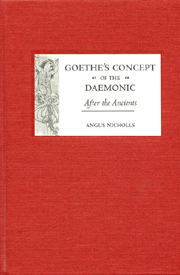Book contents
- Frontmatter
- Contents
- Editions and Abbreviations
- Acknowledgments
- Introduction
- 1 The Ancients and Their Daemons
- 2 The Daemonic in the Philosophy of the Sturm und Drang: Hamann and Herder
- 3 Romanticism and Unlimited Subjectivity: “Mahomets Gesang”
- 4 Werther: The Pathology of an Aesthetic Idea
- 5 Kantian Science and the Limits of Subjectivity
- 6 Schelling, Naturphilosophie, and “Mächtiges Überraschen”
- 7 After the Ancients: Dichtung und Wahrheit and “Urworte. Orphisch”
- 8 Eckermann, or the Daemonic and the Political
- Epilogue: Socrates and the Cicadas
- Works Cited
- Index
2 - The Daemonic in the Philosophy of the Sturm und Drang: Hamann and Herder
Published online by Cambridge University Press: 05 February 2013
- Frontmatter
- Contents
- Editions and Abbreviations
- Acknowledgments
- Introduction
- 1 The Ancients and Their Daemons
- 2 The Daemonic in the Philosophy of the Sturm und Drang: Hamann and Herder
- 3 Romanticism and Unlimited Subjectivity: “Mahomets Gesang”
- 4 Werther: The Pathology of an Aesthetic Idea
- 5 Kantian Science and the Limits of Subjectivity
- 6 Schelling, Naturphilosophie, and “Mächtiges Überraschen”
- 7 After the Ancients: Dichtung und Wahrheit and “Urworte. Orphisch”
- 8 Eckermann, or the Daemonic and the Political
- Epilogue: Socrates and the Cicadas
- Works Cited
- Index
Summary
Man ahndete hier einen tiefdenkenden gründlichen Mann, der mit der offenbaren Welt und Literatur genau bekannt, doch auch noch etwas Geheimes, Unerforschliches gelten ließ, und sich darüber auf eine ganz eigne Weise aussprach.
(FA 1,14:558)So wrote Goethe of Johann Georg Hamann's Sokratische Denk-würdigkeiten (Socratic Memorabilia, 1759), a volume that brought the Socratic daimonion back to life within the context of the European Enlightenment. Hamann is the key historical figure in the resurgence of the classical concept of the daemon, and the general sensibility of das Dämonische, in the Sturm und Drang period of German literature and philosophy, and Hamann's influence upon the young Goethe also exerted itself through his (Hamann's) chief disciple: Johann Gottfried Herder. Following an analysis of Hamann's Sokratische Denkwürdigkeiten, this chapter will examine the role played by Herder in Goethe's early literary and philosophical development, by way of an analysis of various essays by Herder written during the 1760s and 1770s concerning the theory of language and particularly the concept of genius, a concept that Herder, like Hamann, connected with the classical concept of the daemon.
As we saw in the previous chapter, the tendency to associate the concept of the daemon with that of genius can already be found in some Stoic and Neo-Platonic texts. Around the middle of the eighteenth century, the relationship between these concepts was reconfigured as part of a broader process of secularization associated with the European Enlightenment — a process in which Herder would come to play a key role.
- Type
- Chapter
- Information
- Goethe's Concept of the DaemonicAfter the Ancients, pp. 77 - 105Publisher: Boydell & BrewerPrint publication year: 2006

